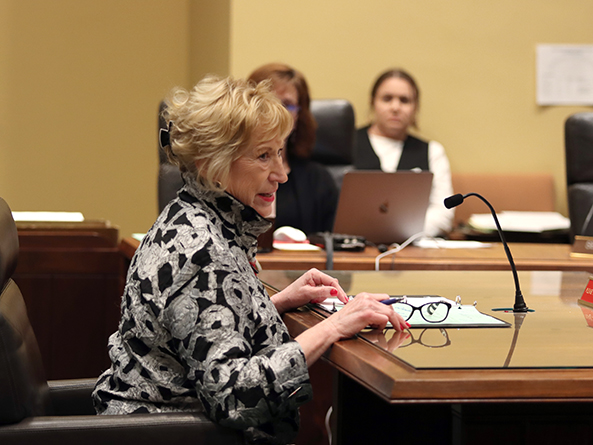Petition signature removal change considered
The Government, Military and Veterans Affairs Committee heard testimony Jan. 31 on a bill intended to simplify the process for removing a voter’s signature from an election petition or referendum.

Currently, a voter may remove their name from an election petition by an affidavit signed and sworn to before an election commissioner, county clerk or notary public.
LB861, sponsored by Elkhorn Sen. Lou Ann Linehan, would allow voters to remove their name by instead providing a signed letter to an election commissioner, county clerk or the Nebraska secretary of state. Falsifying such a letter would be a Class IV felony, punishable by a maximum of two years imprisonment and one year post-release supervision.
Linehan said she brought the bill after receiving video of petition circulators “spreading lies” in their attempt to gather signatures to repeal the Opportunity Scholarships Act — a bill she sponsored, which passed in 2023. Several voters who felt they had been deceived sought to remove their names from the petition, she said, and were told they would have to submit a notarized affidavit.
“For some people — actually, I would say most people — who have limited time or have no easy access to a notary, this became a serious problem,” Linehan said.
She brought an amendment to the committee that would require the election official who receives the letter to verify the signature through voter registration records.
Clarice Jackson of Omaha testified in support of the proposal, saying a person should not have to “go through hoops” to remove their name from a petition. It shouldn’t be harder for a voter to remove their name if they believe they’ve been misled, she said, than it is for them to sign in the first place.
Sheri St. Clair, representing the League of Women Voters, testified in opposition. Petition drives are difficult, time-consuming and expensive, she said, and shouldn’t be able to be reversed easily. She expressed concern that voters who sign petitions could be subject to “harassment” campaigns from opponents in an attempt to remove signatures.
“[LB861] may raise the potential for well-funded opposition organizations to, essentially, use false media promotions, misleading advertisements and [provision of] stamped, self-addressed envelopes to simplify the process,” St. Clair said.
Also speaking in opposition was Heidi Uhing, public policy director at Civic Nebraska. She echoed concerns that removing security measures to take a signature off a petition could open voters up to pressure.
In addition, she said, voters who change their mind after signing a petition already have options for removing their name or can simply vote against the measure if it comes up on the ballot.
“Signing on to support a ballot initiative or referendum is not the final stage of this process,” Uhing said.
The committee took no immediate action on the proposal.


